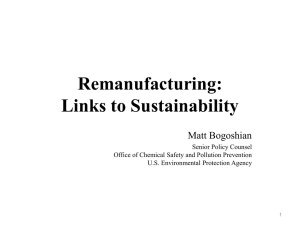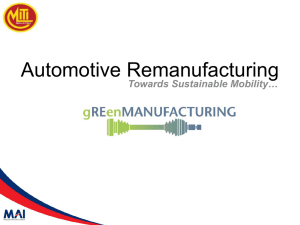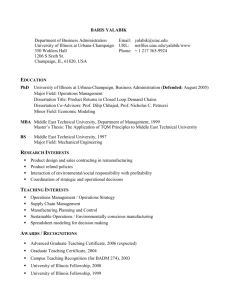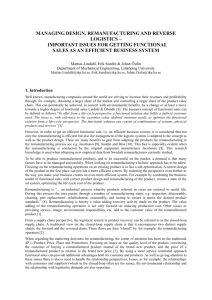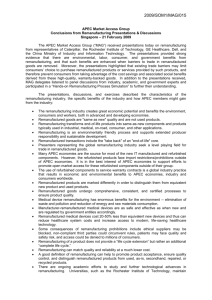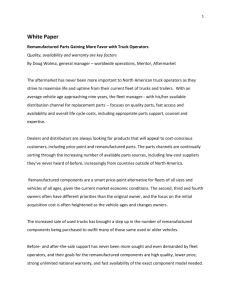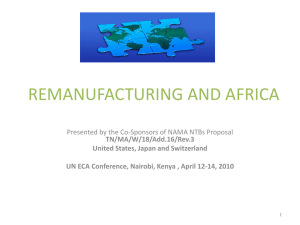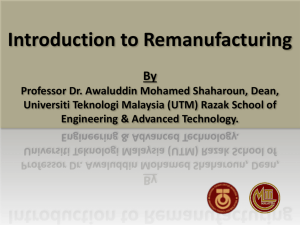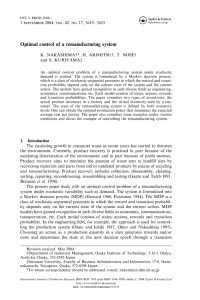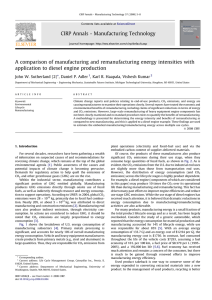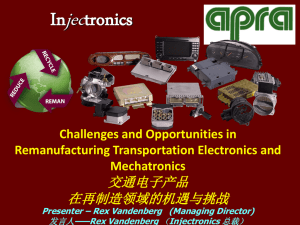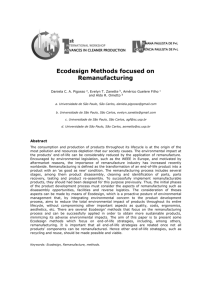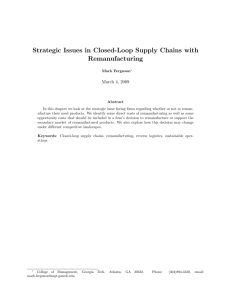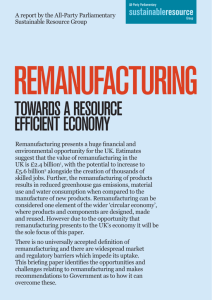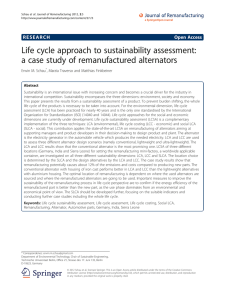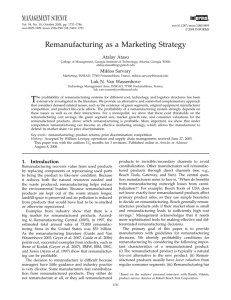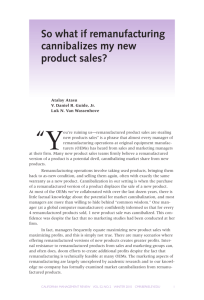REMANUFACTURING
advertisement
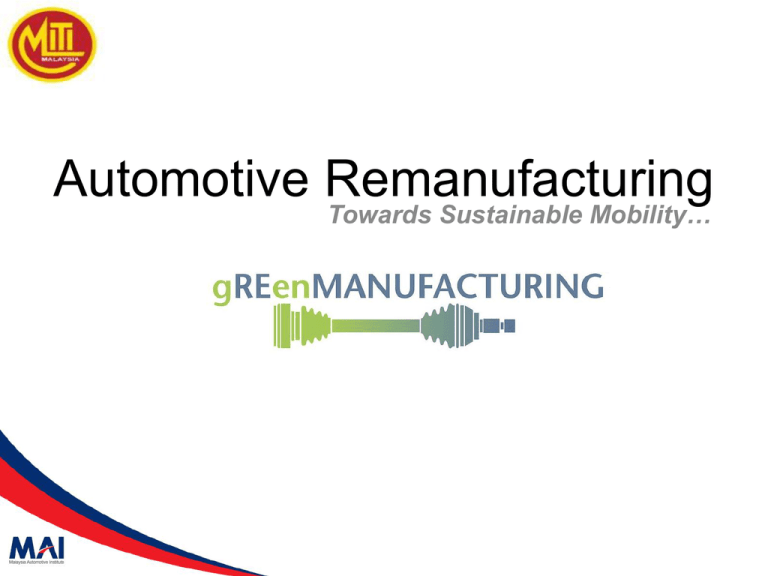
Automotive Remanufacturing Towards Sustainable Mobility… INTRODUCTION • Remanufacturing , is the practice of taking end-of-life goods and rebuilding them into new or better condition ones, with a warranty to match. • Remanufacture ensures the same product quality, durability and performance as new components while maintaining sustainability of resources Nature Materials Remanufacturing Manufacturing Products Usage Waste Reuse Recycle Disposal Source : Advance Remanufacturing Technology Centre REMANUFACTURING IS ALSO KNOWN AS… Rebuilt Rebuilt is synonymous with remanufacturing when used in connection with motor vehicle parts and systems but not the entire vehicle. Refurbished Refurbished is synonymous with remanufacturing of furniture systems for offices, hotel lobbies, and hospitals. Recharged Recharged is synonymous with remanufacturing when used in connection with imaging products, such as laser toner cartridges. Factory Reconditioned or Recertified Factory reconditioned or recertified is synonymous with remanufacturing when referring to consumer products, such as electrical hand tools. Source: Dr. Nabil Nasr of the Golisano Sustainability Institute of the Rochester Institute of Technology is gratefully acknowledged). 3 FINAL TESTING PRODUCT REASSEMBLY RECONDITIONING OF PARTSAND / OR REPLENISHING BY NEW PARTS INSPECTION AND SORTING OF ALL PARTS THOROUGH CLEANING OF THE PARTS COMPLETE DISASSEMBLY OF THE PRODUCT REMANUFACTURING PROCESS STANDARDS OPERATING PROCEDURE (SOP) PROCESS FLOW Product Correction & Reverse Logistics No Needed in production Incoming receiving Store until needed Yes Pass Initial Inspection Initial inspection Disassembly / Demanufacture Planned Salvage Cleaning Planned Discard Remanufacturing or Restoration Process Failed Initial Inspection Process Scrap Recycle In Process Inspection Fallout Rework Component Recertification Pass Fail Rework Assembly New Components Final Product Inspection Pass Warehouse Shipping TYPES OF REMANUFACTURING PRODUCTS • Remanufactured products include: – A/C Compressors – Alternators – Engines – Fuel System Components – Rack and Pinion Steering – Starters – Steering Gear Boxes – Transmissions – Turbochargers – Water Pumps Source: William A. Tanenbaum, Kaye Scholer LLP, Chair, Technology, Intellectual Property & Outsourcing Group Green Technology Group New York Office 6 WHY REMANUFACTURING? ENVIRONMENTALLY SUSTAINABLE? • Reduces energy costs and environmental impact of: – Raw materials and natural resources – Manufacturing products – Shipping components and final product • What are the environment savings? – Saves enough natural resources to fill a train 1,100 miles long! – Saves enough energy to power 6 million automobiles! 7 REMANUFACTURING BENEFITS Approximately 85% of the energy expended in the manufacture of an original product is preserved in the remanufactured product. Recycling Reclaims 8 Material Remanufacturing Reclaims Material Energy from Casting, Machining, etc. Labor from original processes Capital Function/Design Intent Source: MIT study on the remanufacturing of automobile component, 1981 Ecologic Benefit of Reman – Automotive Parts Delco CS 130 100A alternator • The remanufacturing ecological benefit is the recovered energy and avoided environmental impact minus the impact of the remanufacturing processes. CS130 Example: 9 Ecologic Benefit (2) • Material analysis for Delco CS 130 100A alternator: – Kwh used to create one NEW alternator: 61.1 Kwh – CO2 emissions to create one NEW alternator: 66.6 lbs • Benefits from remanufacturing one thousand produced Delco CS 130 100A alternators each year: – Annual energy savings: 37,700 Kwh – Annual CO2 savings: 51,357 lbs Source: William A. Tanenbaum, Kaye Scholer LLP, Chair, Technology, Intellectual Property & Outsourcing Group Green Technology Group New York Office 10 GREEN IMPLICATIONS • Remanufacturing is designed to allow a portion of product to be continuously upgraded with improved version to take advantage of advancing technology • Compared with new components save *: components, Remanufactured – >60% energy – >70% materials – >90% water – >80% pollutant emissions – >80% value retention – 50-70% cost reduction 11 *Source : Advance Remanufacturing Technology Centre REPAIR VS. RECONSTRUCTION • Right of repair includes – Right to preserve useful life – Right to replace individual unpatented elements that themselves have a shorter life • Reconstruction includes – Making a new article (after original article, viewed as a whole, has become “spent”) – Creation of a second entity 12 CHALLENGES • Will remanufacturing products to obtain “green” benefits be deemed “permitted repair” or “prohibited reconstructions” – given the commercial objective of remanufacturing? E.g. But does incorporating a more advanced chip from a third party supplier constitute infringement of that third party’s patents? • Predict use of more expansive contractual provisions, from both licensees and licensors to clarify scope of rights with related to warranty • Test result when remanufacturing includes enhanced or “new” technology – Even if permissible repair of “old” patent, use of “new” technology may require licensee for that patentee • Patentees will argue that provider of enhanced technology is liable for inducing or contributory infringement 13 MOVING FORWARD • Review current related policies e.g. rebuilding, IP. • Standards - recyclability, efficiency, design, material, innovation. • Procedures - energy savings, reduce emissions, enhance safety • Awareness Education THANK YOU
